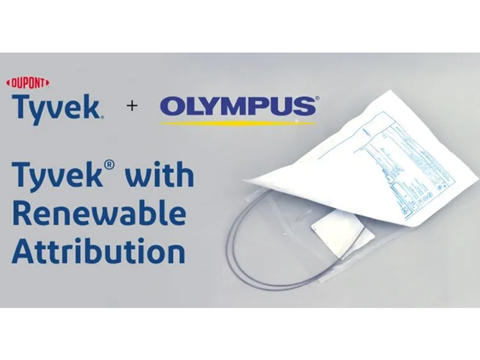
DuPont is helping Olympus Corporation implement renewable feedstocks into its single-use medical device packaging in a mass balance approach, aiming to lower CO2 emissions.
DuPont’s Tyvek with Renewable Attribution is an extension of its existing Tyvek portfolio for healthcare packaging. It uses a certified mass balance approach to replace fossil fuels with renewable feedstocks – a move intended to ‘significantly’ lower the carbon footprint of healthcare packaging without sacrificing performance or regulatory compliance.
In the first phase of the collaboration, Olympus will utilize Tyvek with Renewable Attribution packaging at its Japanese and Vietnamese manufacturing facilities. This is expected to cover over 100 single-use device categories, including sampling and therapeutic devices for GI and respiratory endoscopes.
The companies hope that this process will lower CO2 emissions by approximately one-third of Tyvek’s total carbon footprint.
Olympus plans to gradually expand the initiative to further manufacturing sites and product lines. Its ESG strategy raises ‘Carbon Neutral Society and Circular Economy’ as a focal area, and its collaboration with DuPont is set to further its efforts to achieve carbon neutrality and a circular economy through product stewardship.
“As a global MedTech company, we recognize our responsibility to advance sustainability without compromising the trust and safety that patients and healthcare professionals expect from us,” says Syed Naveed, executive officer and chief technology officer at Olympus. “The adoption of Tyvek with Renewable Attribution in our packaging marks a significant step in reducing our carbon footprint while preserving the integrity and safety of our medical devices.”
David Domnisch, vice president and general manager at DuPont, adds: “Tyvek with Renewable Attribution is designed to help reduce the carbon footprint of a product while providing a drop-in solution that can be seamlessly integrated into existing healthcare packaging products. We are excited to work with Olympus and help advance sustainability in the healthcare sector.”
In other news, TotalEnergies and CooperVision have incorporated mass-balanced, certified renewable polypropylene, derived from feedstock like sunflower and rapeseed oils, into blister packs for certain contact lens products. The transition is expected to reduce 2.3 kg of CO2 equivalent per kilogram of polypropylene and unlock environmental benefits across the value chain.
Additionally, Sustainability Awards finalist PAPACKS aims to replace plastics altogether with its moulded Fiber Bottle. Described as completely plastic-free, the solution is suitable for liquids and non-liquids, including dietary supplements.
If you liked this story, you might also enjoy:
The ultimate guide to the Packaging and Packaging Waste Regulation in 2025
How are the top brands progressing on packaging sustainability?
Everything you need to know about global packaging sustainability regulation in 2025
The key to increasing the use of reusable packaging in supermarkets













No comments yet